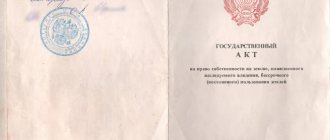Classification of types of ownership of land
The legislation of the Russian Federation provides for several forms of ownership. According to this classification, there are:
- Public property - in this case, the right to a land plot extends to the whole society or state.
- Private property - a citizen has a full range of rights to a land plot. He can sell, donate, exchange a land plot, that is, he owns it, disposes of it and uses it at his own discretion without violating the laws of the Russian Federation.
Considered from a legal point of view, ownership can be joint or sole. Property under common ownership tends to belong to several persons at once and be in shared or joint ownership. Sole property can be state, municipal or private, depending on the situation and case, as well as the land plot itself and the rights of the citizen to dispose of it.
What it is. Types of private land ownership
The right of private ownership of land is a type of property in which ownership and disposal of it belongs to an individual or company.
The subject of the relationship in this case will be a plot within the boundaries established by law, which was obtained by following a certain procedure. At the same time, you can manage not only the soil, but also all the reservoirs and forests that are located on the territory of the allotment. Unless, of course, it is prohibited by law.
The following may own a plot of land as private property:
- citizens of the Russian Federation;
- organizations of all forms of ownership;
- Foreigners;
- stateless persons;
- companies registered abroad.
There are the following types of private land ownership:
- individual ownership of both ordinary citizens and various organizations;
- joint possession, when the parts of each owner are not determined;
- common shared ownership.
Both ordinary people and several companies can unite to jointly own a plot.
Norms of the Constitution and legislation of the Russian Federation
The main classification of property rights according to Article 8 of the Constitution of the Russian Federation and Article 212 of the Civil Code of the Russian Federation has the following categories:
- private property - in this case the owner is an individual or legal entity;
- state property - these objects are on the account of the state and are federal property;
- municipal property - in this case the subject is a rural settlement or city;
- other.
Forms of ownership of land plots
During the Soviet era, all land was the property of the state, but now, according to the Constitution, citizens of the Russian Federation have the right to register a plot of land as private property. It provides the following:
- the right of ownership, disposal, use is assigned to a citizen or a group of persons who are in shared or joint ownership;
- all rights are regulated by the Constitution of the Russian Federation, the Land Code of the Russian Federation, Federal Laws;
- Depending on the ownership of land, different laws and regulations apply;
- The cadastral chamber provides information on a specific plot of land.
Private property
A plot of land can be registered as private property in several ways:
- Through the privatization of municipal or state land. In this case, the citizen has the legal right to receive an allotment of private property, which was issued free of charge back in the USSR. According to the legislation of the Russian Federation, a citizen has the opportunity to use the right to free privatization once.
- Under a gift agreement or as a result of inheritance. A land plot can be donated by its legal owner or be legally inherited.
- Under a land purchase and sale agreement. You can conclude a deal either with a private person or with the state. If a plot of land is leased, then a citizen can buy it (if the lessor is the state).
Property of a peasant (farm) enterprise
In accordance with Art.
257 of the Civil Code of the Russian Federation, the property of a peasant (farm) enterprise belongs to its members on the right of joint ownership, unless otherwise established by law or an agreement between them. In paragraph 2 of this article it is noted that the joint ownership of members of a peasant (farm) enterprise includes the land plot granted to this farm or acquired, outbuildings and other buildings, reclamation and other structures, productive and working livestock, poultry, agricultural and other equipment and equipment, vehicles, inventory and other property acquired for the farm using the common funds of its members. Fruits, products and income received as a result of the activities of a peasant (farm) enterprise are the common property of the members of the peasant (farm) enterprise and are used by agreement between them (clause 3 of Article 257 of the Civil Code of the Russian Federation). The division of the property of a peasant (farm) enterprise is carried out on the basis of Art. 258 Civil Code of the Russian Federation. Thus, upon termination of a peasant (farm) enterprise due to the withdrawal of all its members or for other reasons, the common property is subject to division according to the rules provided for in Art. 252 and 254 of the Civil Code of the Russian Federation. In such cases, the land plot is divided according to the rules established by the Civil Code and Land Code of the Russian Federation. A plot of land and means of production belonging to a peasant (farm) enterprise are not subject to division when one of its members leaves the enterprise. Those who leave the farm have the right to receive monetary compensation commensurate with their share in the common ownership of this property. The shares of members of a peasant (farm) enterprise in the right of joint ownership of the property of the enterprise are recognized as equal, unless otherwise established by agreement between them.
The property of a business partnership or cooperative formed on the basis of the property of a peasant (farm) enterprise is determined by Art. 259 of the Civil Code of the Russian Federation. Members of a peasant (farm) enterprise can create a business partnership or production cooperative on the basis of the property of the farm. Such a business partnership or cooperative, as a legal entity, has the right of ownership to property transferred to it in the form of contributions and other contributions by members of the farm, as well as to property received as a result of its activities and acquired on other grounds permitted by law. Paragraph 2 of this article provides that the amount of contributions of participants in a partnership or members of a cooperative created on the basis of the property of a peasant (farm) farm is established based on their shares in the right of common ownership of the property of the farm.
Chapter 17 of the Civil Code of the Russian Federation “Ownership and other real rights to land” considers not only general provisions on the right of ownership of land, but also regulates certain issues. Yes, Art. 262 of this Code “Land for public use. Access to a land plot" stipulates the following: "Citizens have the right to freely, without any permits, be on land plots that are not closed to public access and are in state or municipal ownership, and to use the natural objects available on these plots within the limits permitted by law and other legal acts, as well as the owner of the relevant land plot. Unless a plot of land is fenced or the owner has otherwise clearly indicated that entry to the plot without his permission is not permitted, any person may pass through the plot provided that doing so does not cause damage or disturbance to the owner.”
Features of common ownership of plots of agricultural land
The specifics of ownership, use and disposal of lands of this category are specified in the Land Code of the Russian Federation, as well as in the Federal Law of July 24, 2007 No. 101-FZ “On the turnover of agricultural lands”. The main feature of land in this category is a strictly defined purpose, which cannot be changed even if these areas are disposed of.
There are also specific features for allocating a land share from lands of this category. In this case, the decision to form a new plot through allotment on account of the land share is made by the general meeting of participants in the common shared ownership, and if such a decision is absent, the applicant has the right to contact a cadastral engineer to carry out land surveying of a new plot for subsequent allotment.
State and municipal bodies have a pre-emptive right to purchase a plot of agricultural land for sale, therefore the seller is obliged to notify the executive authority of the upcoming alienation. Transfer of agricultural land to other categories is allowed only in exceptional cases.
Author of the article
Who can it belong to?
Garden partnerships, country houses and farms also have the right to receive land as their property for farming.
According to Article 15 of the Land Code, ownership in this case is negotiated between persons.
What rights are given to a citizen if he receives ownership of a plot of land? This:
- The owner can alienate the site along with all buildings and structures on it.
- A land owner has many more advantages when purchasing land than when renting it.
- The owner can only dispose of land that has been withdrawn from state circulation.
- If a citizen’s land is taken away legally, he has the right to monetary compensation only if it was not confiscation due to the citizen’s unlawful actions in relation to the use of the plot.
- A citizen may lose the right to property if it was used as collateral when taking out a mortgage loan or pledged to other financial institutions. If the owner does not fulfill his obligations to the bank, then the latter has every right to collect for non-payment of the debt. A citizen may also lose his land if he goes bankrupt.
- A citizen has the right to use land for personal needs or purposes.
Owner's responsibilities
The duties of a citizen include:
- the land plot must be used for its intended purpose;
- The boundaries of the land plot must be observed according to the cadastral plan;
- agrotechnical work must be carried out;
- the owner is required to pay taxes.
If the owner uses the site for other purposes or violates the procedure established by law, he may be deprived of his property rights.
Grounds and procedure for alienation of privately owned land
The right to own a land plot may be terminated in the following cases:
- when transferring a land plot to other persons;
- if the owner himself renounces the right of ownership;
- collection of land for debts of the owner;
- the land was not used for its intended purpose;
- when operating a site in violation of the law;
- temporary seizure of land during natural disasters and epidemics in order to protect the interests of citizens;
- taking away a plot in the interests of the state or municipality;
- nationalization of lands;
- confiscation;
- alienation of a plot if, by law, it cannot belong to this person.
In the case where the owner voluntarily renounces the land, he must draw up the relevant documents with a notary. The owner also has the right to donate, sell, and bequeath his property.
If a decision is made to confiscate land, it is taken free of charge by court decision. But such alienation is used as a punishment for serious crimes.
When a plot is temporarily withdrawn, its owner is given a corresponding document and the amount of the possible loss is paid, and when the circumstances on the basis of which the land was taken end, the owner can get it back.
When a plot is taken in the interests of the state or municipality, the owner is notified in writing about it a year before the event, the cost of the plot is paid, or an equivalent one is provided elsewhere.
If the land is taken for debts, then you need to obtain a corresponding court decision, make an inventory and evaluate the site. Then it is sold at auction, the debt obligations are paid off, and the difference is given to the owner.
A plot of land can be taken away if it was used for other purposes or in violation of the law. In this case, the owner must be notified in writing of such a decision. If he agrees with him, then the land is sold at auction. Otherwise, you need to go to court.
When alienating a plot, if it cannot belong to this person, then such a decision is made by the court.
Nationalization can be carried out in two ways: as a gratuitous seizure or a full or partial redemption.
The procedure for inheriting land plots is regulated by the Land and Civil Code. A cadastral plan of the territory can be ordered in various ways. We talked about this in detail here. How to find out if a site has been surveyed? All information is in our article.
Public and municipal property. Features of property rights
Municipal lands are those areas that are at the disposal of municipalities. These include lands of federal significance. This category includes lands on a free basis, which were previously assigned and belonged to the state of the Russian Federation. These plots are intended for the development of municipal territories.
Municipal land is used and distributed at the discretion of the authorities. They can sell it, rent it out, transfer it into private ownership.
The municipality can also dispose of land for social purposes.
State uniform
State lands are areas that are in state ownership. First of all this:
- nature reserves, park areas;
- strategic lands;
- research centers sites;
- lands intended for storing radioactive waste;
- other objects.
These lands have been withdrawn from circulation.









